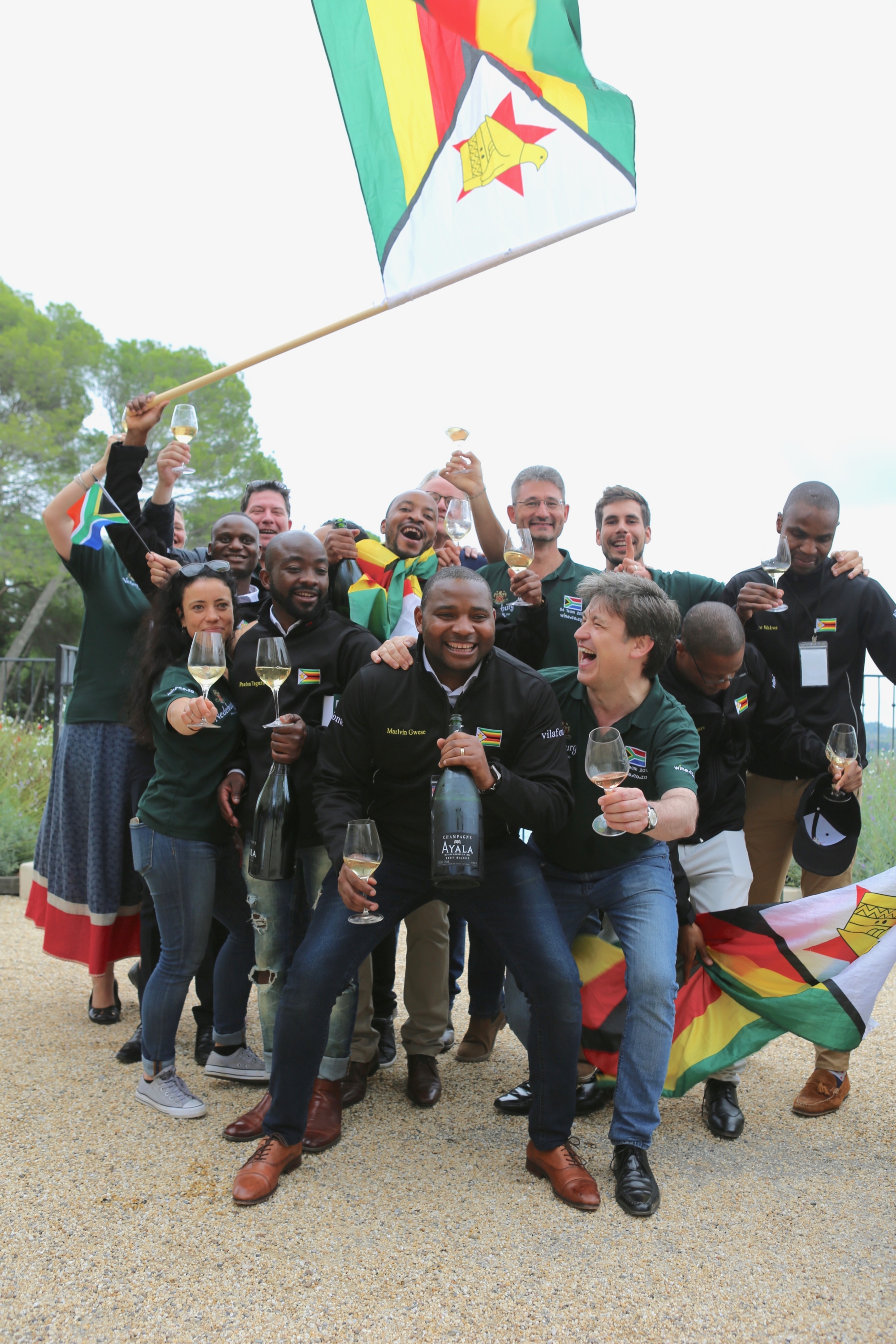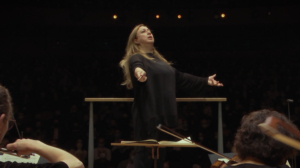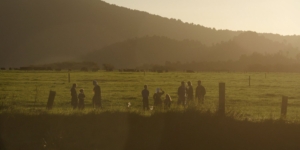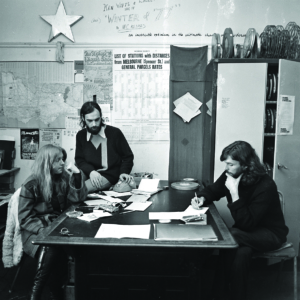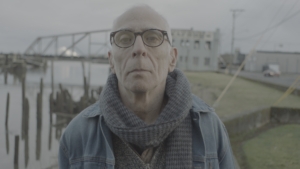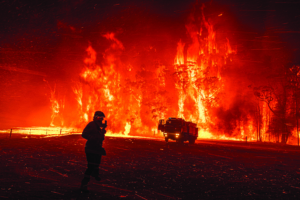Warwick Ross and Rob Coe on Blind Ambition
Following the unlikely story of a group of four Zimbabwean refugee teetotallers-turned-sommeliers as they participate in the highly competitive La Revue du vin de France blind[1]‘Blind’ tasting refers to the practice of guessing a wine’s characteristics (including provenance, varietal and vintage) without having access to any identifying information. See Qian Janice Wang & Domen Prešern, ‘Does Blind Wine Tasting Work? Investigating the Impact of Training on Blind Tasting Accuracy and Wine Preference’, Science & Wine, 1 July 2018, <https://www.ciencia-e-vinho.com/2018/07/01/does-blind-wine-tasting-work-investigating-the-impact-of-training-on-blind-tasting-accuracy-and-wine-preference/>, accessed 28 April 2022. wine-tasting World Championship in Burgundy, France, Warwick Ross and Rob Coe’s Blind Ambition (2021) serves as a loose companion piece to the filmmakers’ AACTA Award–winning wine documentary Red Obsession (Ross & David Roach, 2013).[2]Coe executive-produced the 2013 film, while Ross also served as co-writer and producer.
I talk to the directors about this new documentary, how COVID-associated delays allowed their material to evolve, and why the wine industry is so ethnically and culturally homogeneous.
Oliver Pfeiffer: How did the idea for Blind Ambition develop?
Warwick Ross: Jancis Robinson[3]Robinson is a world-renowned British wine critic who writes for the Financial Times and edited The Oxford Companion to Wine (Oxford University Press, Oxford, UK, 1994). was an interviewee in my last film, Red Obsession, and knew we were looking for another documentary subject. She emailed to say she [had come] across what was the most remarkable story, of these four Zimbabwean refugees[4]The film’s four protagonists who make up Team Zimbabwe are Joseph Dhafana, Marlvin Gwese, Tinashe Nyamudoka and Pardon Taguzu. who were […] going to compete at the [World Championship]. She had met them in South Africa and thought their story was astounding.
Rob and I were very excited about the concept, and when we spoke to them, we were completely charmed by [them] – their story, their enthusiasm, their exuberance, their resilience. They were an extraordinary group of guys who had undergone a lot of hardship getting across Zimbabwe and almost dying in the process. They were very upbeat and very excited about putting this very first Team Zimbabwe together for the championships.
We hadn’t time to raise any funds, so we financed the first part of the film ourselves; three weeks later, we were on the plane to Cape Town with a small crew to catch the story.
Rob Coe: When we Skyped the guys, we realised there was a lot more depth to the story: it wasn’t just about a crazy bunch of guys who were going to challenge the world with something they don’t normally do; it was a much richer story of belonging, and a story of refugees and resilience […] It was quite an incredible thing to experience when, [after] former president Robert Mugabe was forced to resign, [we went] back to Zimbabwe with our four protagonists. Travelling with them was an insightful and enlightening journey.
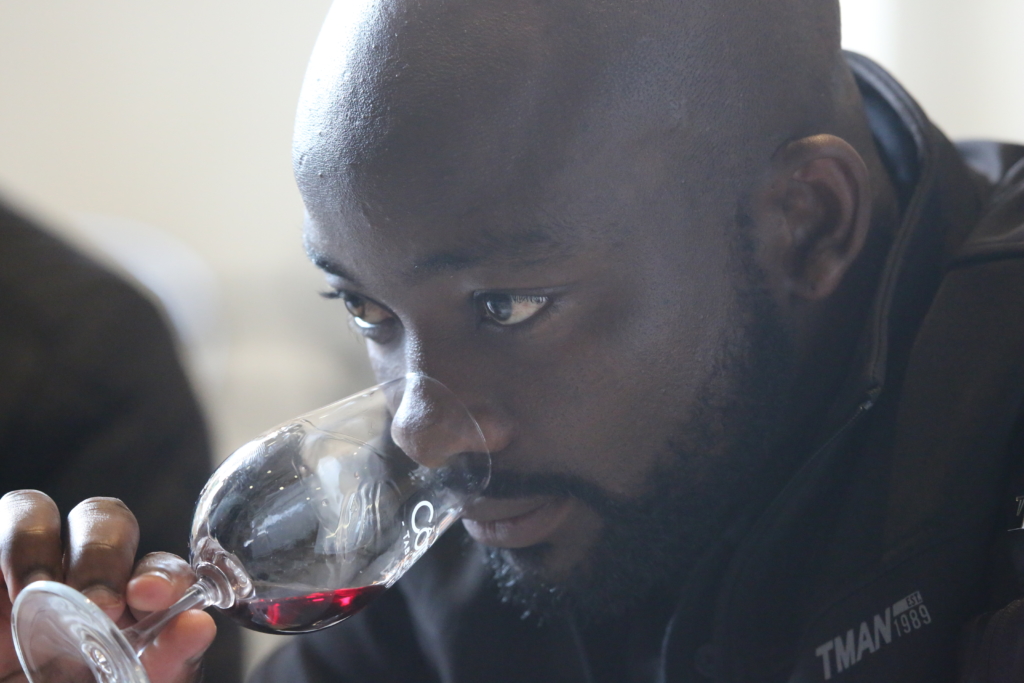
And this was all shot pre-COVID …
WR: Yes. We managed to film through the end of 2017, 2018 and the last part of 2019. The first part of 2020 was editing and finalising the film. We were all ready to go by January/February. In 2020, COVID suddenly slammed the door shut on cinemas and any prospect of the film being released. We didn’t know how long [it would be until] cinemas would reopen, but felt that the film was a strong story – it was very theatrical – and the advice […] was to wait until the cinemas were back […] We didn’t quite realise it would be eighteen months or more before they opened up again.
Did the overall direction of the documentary evolve over that time?
WR: Yes, it did. We were very happy with the film; however, when you’re given the opportunity of more time, there aren’t many filmmakers who wouldn’t look at what they have and think how they can make it better. We had an opportunity to think how we could generate more drama, more interest in the middle of the film – particularly with the two coaches, Jean [Vincent Ridon] and Denis [Garret]. We went back through all the footage and found some extra stuff that was terrific. Often, when you go back, you wonder why you didn’t see it the first time around.
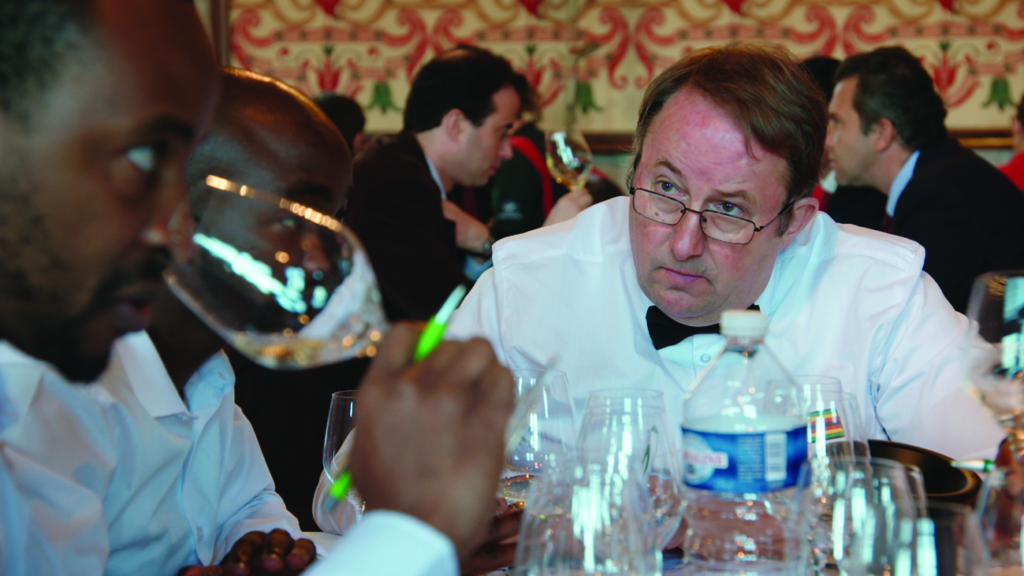
RC: Compared to Red Obsession, this was a human story, and we both had a similar vision at the start, which was to embrace the story of these four guys and let their story do all the work and have a very light touch. It was like meeting a person where you get to know them superficially – ‘Oh, they’re really fun; they’re charismatic and really good at what they do, being sommeliers and wine-tasting’ – however, the more time we spent with them, the more we got to know [them] and we developed a rapport and they trusted us, and so the documentary evolved […] We didn’t know initially that we would be going to such dark places, but we felt it was essential to really convey that story to the audience, where they fully understand the journey that the guys went on.
At the same time, being in France with them and experiencing the chaos with Denis … from the moment we met him, those moments of levity allowed us to contrast with their backstories. So, in that sense, the documentary evolved [further] the more time we spent with them. We didn’t want this to be just about the struggle; we wanted this to be about the hope as well, and [about how] they held this optimism.
How hard was it to strike that balance?
WR: The film takes its cue very much from the personality of the four guys and [how], despite the hardships that they’ve been through, they’re positive and enthusiastic. We felt going really heavy on the deprivations that they’d suffered and the political scene in Zimbabwe during that time would probably unseat the main story. In the editing room, you tend to get enthusiastic about the historical aspects and what can be brought to the film by focusing on Prince Charles handing back […] power to Mugabe in 1980 […] It was so tempting to have an element of that in there, but we just felt it unbalanced the film.
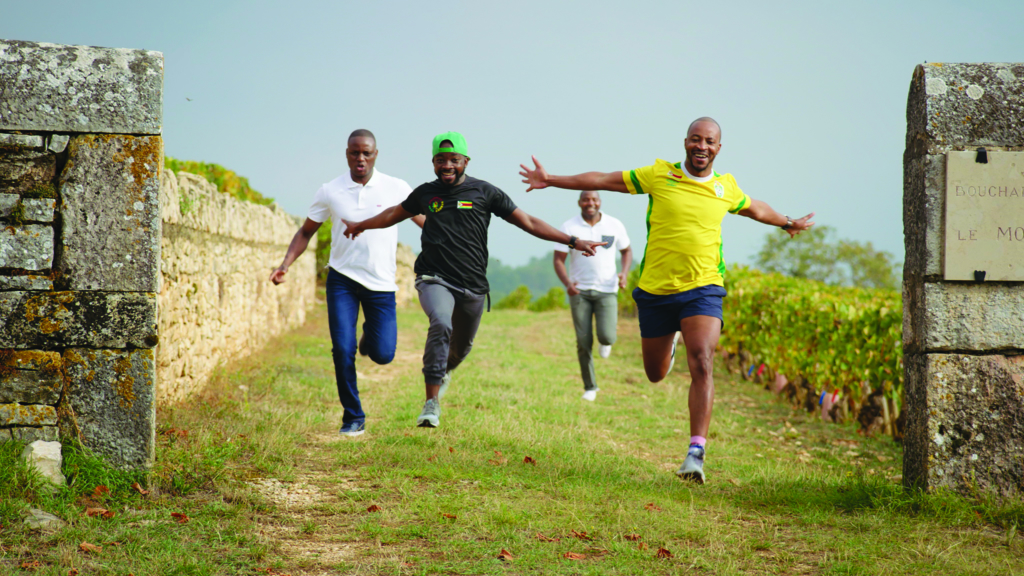
Some of the comedy comes from those two wine coaches you mentioned, who are completely at odds: you have Ridon, who has a very by-the-book approach, and the rather impulsive Garret. Was that quite strategic? Did you anticipate the drama Garret would cause, for instance?
WR: It didn’t take terribly long, once we met Denis, to figure out he was going to bring some sort of chaos to the situation. Jean, by comparison, as you pointed out, was very much by-the-book and a very organised person. He knew how to help the guys taste their wines. Denis, on the other hand, loved having a good time, loved finding a good place with a good bottle of wine and spending the rest of the night getting through as many bottles as he could find. Whether he saw that as introducing the boys to the different styles, types and varietals … he may well have, but it was always about enjoying himself, and I think that comes across.
RC: In the editing room, we felt that you could not have scripted a better character [than] Denis Garret. At the very beginning of the journey, we had to pull our editor, Paul Murphy, back from making the documentary entirely about Denis and remind ourselves that, although there was such a wonderful story there, […] and having those two different coaches led to [the kind of] great drama and conflict that every film or story looks for, […] what was going to drive us through, once the guys had reached France, was that the training was exhausting, and [that] they were going from town to town drinking wine and tasting.
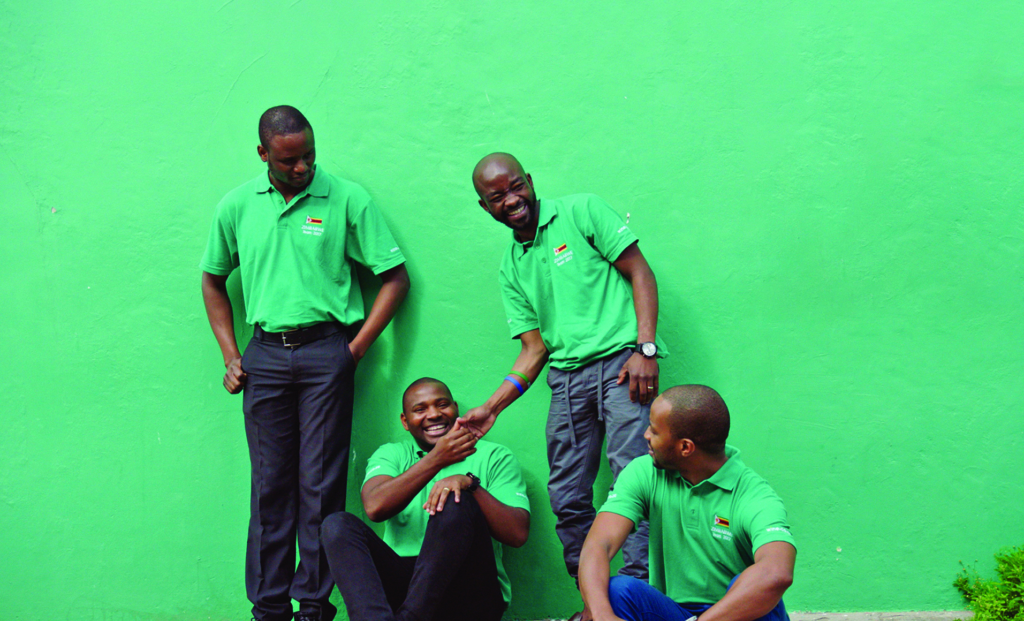
At one point, Robinson admits that ‘the world of wine is very bad at diversity’, and that it is ‘occupied by wall-to-wall white faces’. Was this a catalyst for the documentary?
WR: Yes, very much so. In fact, we took that description from footage we shot during Red Obsession. In [that documentary], the Chinese were coming into the mix, and were buying up all the chateaus and very expensive wines. They were interested from more of a prestige point of view […] but the element of diversity was really quite different.
We asked the question [about why] we don’t see many Black guys or Black girls tasting: ‘What’s the reason?’ On the surface, it was relatively obvious that wine culture tends to come from Italy, France and Spain […] and there’s not much wine culture emanating from the African continent; even in South Africa, most of the wine emanates from Cape Town, where it was all originally [brought over by] the Dutch. And so we felt this was a terrific opportunity to allow the world to see the rewards that could come with opening yourself [up] to diversity and inclusion. When the guys turned up in Burgundy and were entering that room, and the night before at the welcome dinner, far from getting a frosty reception, they were welcomed warmly and wholeheartedly to be part of the world of wine.
‘On the surface, it was relatively obvious that wine culture tends to come from Italy, France and Spain … so we felt this was a terrific opportunity to allow the world to see the rewards that could come with opening yourself [up] to diversity and inclusion.’
– Warwick Ross
RC: We knew the wine industry was originally wealthy, privileged and white, and that’s the way it’s been for centuries. Jancis highlights it best [that] that lack of diversity is ruining the industry, and [how addressing that] is a real opportunity for them to open their doors to a much bigger audience. I think we can all agree that when you are inclusive, it is a far better outcome […]
There were two reasons for this lack of diversity: one was on a socio-economic level, and the other [was] the opportunity […] Our guys were able to overcome both of those: [the first way was] through the support of crowdfunding, which allows them to fly to France because they couldn’t afford it; and the second was the competition, with the other wine team opening their arms […] We wanted to show that scratching of the surface and [what] could be achieved when you open your eyes and open your world to everything else that is out there.
Blind Ambition is a kind of companion piece to Red Obsession in terms of its subject matter. Why is wine such an appealing topic for you?
WR: I think it has something to do with the fact that I’m not just a filmmaker, but I [also] have a vineyard on the Mornington Peninsula where we make pinot noir and chardonnay. I’ve always been very interested in wine and being a filmmaker, although mainly [through] scripted feature films like Young Einstein [Yahoo Serious, 1988],[5]Ross worked as a producer on Young Einstein, as well as on Yahoo Serious’ later films Reckless Kelly (1993) – which he also co-wrote – and Mr. Accident (2000). [… and] there was an opportunity with Red Obsession to bring those two worlds together.
Our associate producer, Andrew Caillard, who is a Master of Wine, started talking about Bordeaux and – this was before Red Obsession, when he knew I was a filmmaker and also had a vineyard – he was the first to say, ‘Have you ever thought about making a film about wine?’ He began explaining what was happening in Bordeaux, the rise of China [and] the power shift from the West to the East. That triggered real interest in me – partly because I was born in Hong Kong, and the threat of communist China just across the border was very real and present. But that thing about China – tying China to wine to Bordeaux – I think that’s where the interest started, and Blind Ambition was really a natural progression.
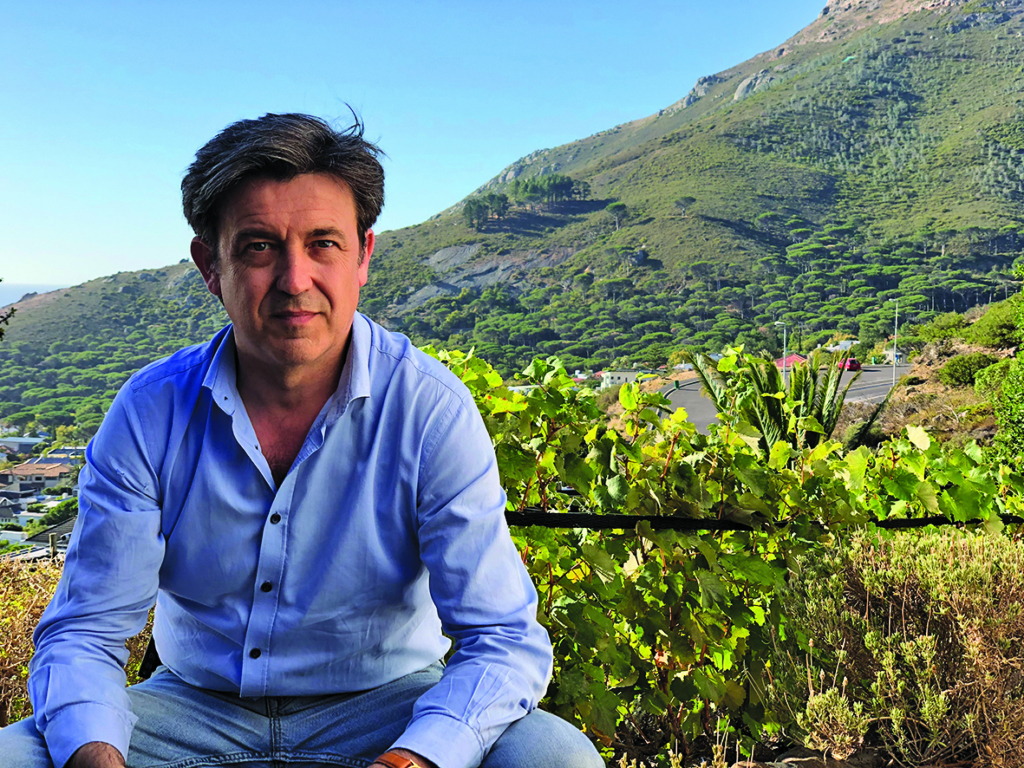
Ultimately, Blind Ambition isn’t really about winning the competition; it’s the journey and being accepted against all odds that’s remarkable. Do you feel this is why it has received such a warm festival audience reception?[6]Blind Ambition has received audience awards at the Tribeca, Sydney and Sonoma film festivals.
WR: Yes, I think that’s it. I don’t think anybody really thinks they’re going to win this competition. It would be almost impossible, unless they completely lucked out guessing those wines […] The question was: ‘Would they come last?’ or ‘Would they at least post a few runs on the board [and] feel proud?’ […] Beyond that, it’s a very human story about their triumph, way beyond whether they win or lose a wine competition. It’s whether they win in life – and I think that’s what people were responding to.
Endnotes
| 1 | ‘Blind’ tasting refers to the practice of guessing a wine’s characteristics (including provenance, varietal and vintage) without having access to any identifying information. See Qian Janice Wang & Domen Prešern, ‘Does Blind Wine Tasting Work? Investigating the Impact of Training on Blind Tasting Accuracy and Wine Preference’, Science & Wine, 1 July 2018, <https://www.ciencia-e-vinho.com/2018/07/01/does-blind-wine-tasting-work-investigating-the-impact-of-training-on-blind-tasting-accuracy-and-wine-preference/>, accessed 28 April 2022. |
|---|---|
| 2 | Coe executive-produced the 2013 film, while Ross also served as co-writer and producer. |
| 3 | Robinson is a world-renowned British wine critic who writes for the Financial Times and edited The Oxford Companion to Wine (Oxford University Press, Oxford, UK, 1994). |
| 4 | The film’s four protagonists who make up Team Zimbabwe are Joseph Dhafana, Marlvin Gwese, Tinashe Nyamudoka and Pardon Taguzu. |
| 5 | Ross worked as a producer on Young Einstein, as well as on Yahoo Serious’ later films Reckless Kelly (1993) – which he also co-wrote – and Mr. Accident (2000). |
| 6 | Blind Ambition has received audience awards at the Tribeca, Sydney and Sonoma film festivals. |
